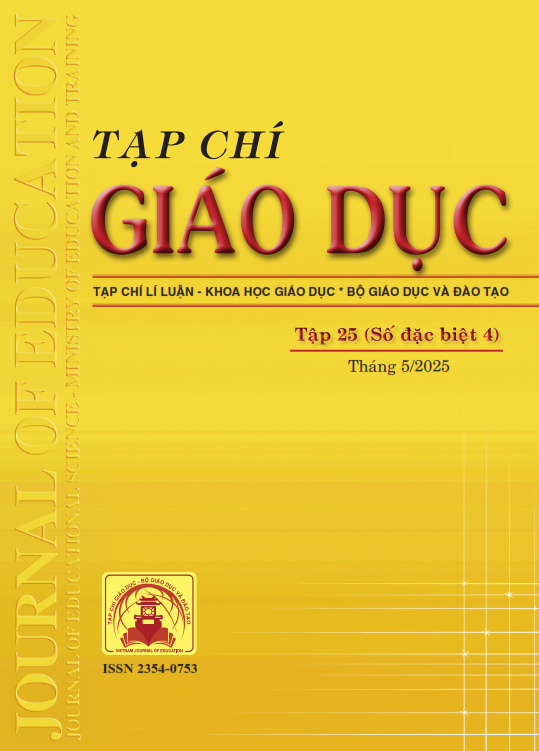Ứng dụng công cụ trí tuệ nhân tạo Memobot vào phân tích dữ liệu định tính từ phỏng vấn bán cấu trúc: Kinh nghiệm và khuyến nghị
Tóm tắt
Analyzing qualitative data from semi-structure interviews play a crucial rule in qualitative research. This study explores the effectiveness of Memobot, an artificial intelligence (AI) tool, in processing and analyzing qualitative data from interviews. Through an experimental study at Hoa Lu University, the research team applied Memobot to automatically transcribe, summarize content, and identify key themes from 11 interviews with students. The results showed that Memobot saves time, increases accuracy, and reduces errors compared to manual methods. However, the study also pointed out some limitations including limited ability to recognize local accents, accuracy dependence on audio quality, and inability to replace humans in interpreting linguistic nuances. The study proposes combining Memobot with other analysis tools such as NVivo while training researchers on AI and improving data security. The study contributes to the field of AI applications in social sciences, opening up research directions on integrating AI into advanced qualitative analysis, helping to optimize educational and social research.
Tài liệu tham khảo
Bryman, A., & Burgess, B. (2002). Analyzing Qualitative Data. Routledge.
Cao Quốc Việt, Nguyễn Thị Bích Châm, Bạch Ngọc Hoàng Ánh (2020). Áp dụng nghiên cứu định tính cho các nghiên cứu trong lĩnh vực quản trị - Lí thuyết và kinh nghiệm thực tiễn. Tạp chí Khoa học Yersin, 8, 3-10. https://tckhyersin.edu.vn/bai-viet/ap-dung-nghien-cuu-dinh-tinh-cho-cac-nghien-cuu-trong-linh-vuc-quan-tri-ly-thuyet-va-kinh-nghiem-thuc-tien-59
Chubb, L. A. (2023). Me and the Machines: Possibilities and Pitfalls of Using Artificial Intelligence for Qualitative Data Analysis. International Journal of Qualitative Methods, 22. https://doi.org/10.1177/16094069231193593
Dodgson, M. K., & Trotman, A. J. (2021). Lessons learned: Challenges when conducting interview-based research in auditing and methods of coping. AUDITING: A Journal of Practice & Theory, 41(1), 101-113. https://doi.org/10.2308/ajpt-19-098
Erbas, I., & Maksuti, E. (2024). The impact of artificial intelligence on education. International Journal of Innovative Research in Multidisciplinary Education, 03(04). https://doi.org/10.58806/ijirme.2024.v3i4n01
Khalifa, M., & Albadawy, M. (2024). Using artificial intelligence in academic writing and research: An essential productivity tool. Computer Methods and Programs in Biomedicine Update, 5(1), 1-11. https://doi.org/ 10.1016/j.cmpbup.2024.100145
Ravindran, V. (2019). Data analysis in qualitative research. Indian Journal of Continuing Nursing Education, 20(1), 40-45. IJCNE. https://doi.org/10.4103/ijcn.ijcn_1_19
Roulston, K. (2011). Working through Challenges in Doing Interview Research. International Journal of Qualitative Methods, 10(4), 348-366. https://doi.org/10.1177/160940691101000404
Roulston, K. (2018). Interviews in qualitative research. The Encyclopedia of Applied Linguistics, 1-10. https://doi.org/10.1002/9781405198431.wbeal0572.pub3
Trần Trung (2025). Năng lực phân tích dữ liệu trong nghiên cứu khoa học giáo dục của giảng viên đại học. Tạp chí Giáo dục, 25(3), 1-6.
Velazquez, U. A. D. (2024). Artificial intelligence in educational research. In Research Advances in Data Mining Techniques and Applications. IntechOpen. http://dx.doi.org/10.5772/intechopen.113844
Wang, L., & Wang, T. (2024). Integrating AI in academic research - Changing the paradigm. University World News. https://www.universityworldnews.com/post.php?story=20240424125411397
Đã Xuất bản
Cách trích dẫn
Số
Chuyên mục
Giấy phép

Tác phẩm này được cấp phép theo Ghi nhận tác giả của Creative Commons Giấy phép quốc tế 4.0 .












